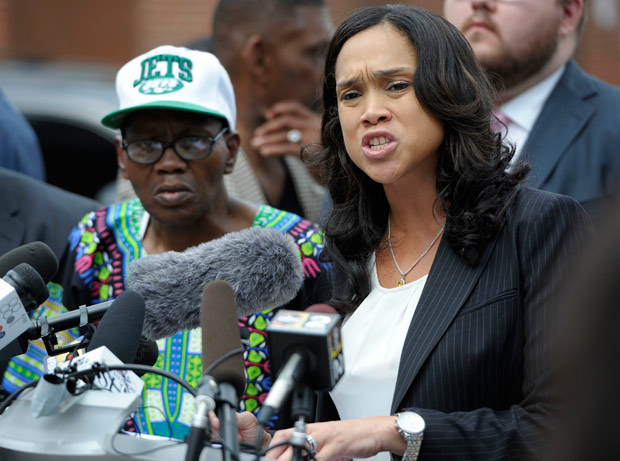Lessons from the Freddie Gray trials
By: DOLAN MEDIA NEWSWIRES//July 29, 2016//

By C. Fraser Smith
Dolan Media Newswires
Her initial 15 minutes of fame came with a swift indictment of six Baltimore cops after Freddie Gray died from injuries suffered in police custody.
The moment ended Wednesday when Baltimore State’s Attorney Marilyn Mosby indicted the entire criminal justice process.
The system had gotten in the way of justice for Gray, she said.
“… Without substantive reforms …,” she said, “we could try this case 100 times and cases just like it with the same result.”
Others would say, no doubt. Without convincing evidence, 100 trials would and should end without the result Mosby wanted. You go to trial with the system you have. Your job is to prove the case you brought.
Under substantial criticism for a rush to judgment with the six indictments, she now owns a string of embarrassing setbacks. More of the same seemed certain if she had persisted. So she gets some credit for cutting her losses.
Her failure on the other hand leaves a residue of misjudgment – even if she is able to effect changes in the system she blames.
In the days prior to Gray’s death – and the death of many other black men across the nation – many were demanding swift and decisive action in other cities.
Mosby’s profile has been drawn admirably from that first day when the charges were announced. Whether the acclaim will persist is debatable.
Republican presidential nominee Donald Trump weighed in with one of his brickbats: She should have prosecuted herself, he said. Trump, of course, never tried a case, ran a city or policed anything.
He’s never dealt with crowds shouting, “No justice, no peace.”
Justice for all
But justice did have to be there for the police as well the alleged perpetrators. Baltimore officials urged people to let the system work. Almost without exception that is what happened. The system’s most stringent critic turns out to be one of its minders: Marilyn Mosby. What reforms had she advocated before?
Justice can seem to be dragging its feet as all the parts of the system come together – or don’t. No doubt it can be improved. But there can’t be room in the system for a prosecutor to move ahead before a strong case is in hand.
One might want to say she was under a lot of pressure. No doubt.
But she could hardly have whispered to the judge or jury, “We didn’t have time for a thorough investigation. We moved quickly so the city wouldn’t burn” – even if that were true. Justice for all may involve some risk-taking. The system has to be fair to the police if it’s work at all.
Preventing burning and looting is in the province of others – mayors or governors and, awkward as that may seem, the police.
Mosby’s gamble
For weeks or months Mosby’s been on the potentially losing end of a gamble: that she could give protesters what they wanted without handing her team an unwinnable case. More time might have allowed her to assemble the evidence needed to convict – if such evidence existed.
Her decision to rest her cases came as another officer’s trial was set to begin. Unofficially at least, many in the legal community and outside it were urging her to act as she did yesterday. It was hard to imagine her staff would have presented new evidence.
Mosby had, herself, been subjected at least indirectly to criticism by Circuit Court Judge Barry Williams, who acquitted the last three officers she had indicted. Williams, who had considerable experience in similar trials, took pains to say he could not convict on the suggestion that something stood to reason. The state’s attorney, he said, had simply failed to prove its case beyond a reasonable doubt.
“We don’t think Freddie Gray killed himself,” Mosby said.
And that may be the most painful realization for her. She and her team were unable to show who, if anyone else, did.
C. Fraser Smith is senior news analyst for WYPR-TV in Baltimore. His email address is [email protected].
Legal News
- State Bar leaders remain deeply divided over special purpose trust
- Former Wisconsin college chancellor fired over porn career is fighting to keep his faculty post
- Pecker says he pledged to be Trump campaign’s ‘eyes and ears’ during 2016 race
- A conservative quest to limit diversity programs gains momentum in states
- Wisconsin prison inmate pleads not guilty to killing cellmate
- Waukesha man sentenced to 30 years for Sex Trafficking
- 12-year-old shot in Milwaukee Wednesday with ‘serious injuries’
- Milwaukee man convicted of laundering proceeds of business email compromise fraud schemes
- Giuliani, Meadows among 18 indicted in Arizona fake electors case
- Some State Bar diversity participants walk away from program
- Wisconsin court issues arrest warrant ‘in error’ for Minocqua Brewing owner
- Iranian nationals charged cyber campaign targeting U.S. Companies
WLJ People
- Power 30 Personal Injury Attorneys – Russell Nicolet
- Power 30 Personal Injury Attorneys – Benjamin Nicolet
- Power 30 Personal Injury Attorneys – Dustin T. Woehl
- Power 30 Personal Injury Attorneys – Katherine Metzger
- Power 30 Personal Injury Attorneys – Joseph Ryan
- Power 30 Personal Injury Attorneys – James M. Ryan
- Power 30 Personal Injury Attorneys – Dana Wachs
- Power 30 Personal Injury Attorneys – Mark L. Thomsen
- Power 30 Personal Injury Attorneys – Matthew Lein
- Power 30 Personal Injury Attorneys – Jeffrey A. Pitman
- Power 30 Personal Injury Attorneys – William Pemberton
- Power 30 Personal Injury Attorneys – Howard S. Sicula











